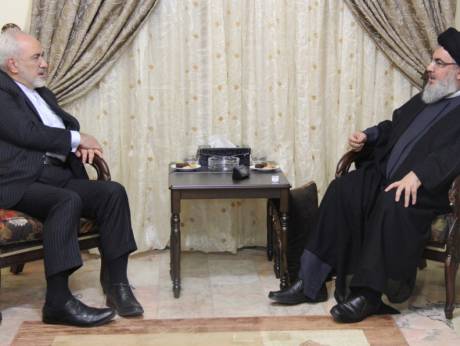By Joseph A. KechichianSenior Writer

Beirut: In what was a surprising declaration, Iranian Foreign Minister Javad Zarif started his two-day visit to Lebanon on Tuesday with an extraordinary meeting with Prime Minister Tammam Salam, whom he praised for his “major role” to “provide security, fight extremism and terror, and find cooperation among the various Lebanese parties.”
Observers were stunned at the tenor used by Zarif, who also met with Hezbollah leader Sayyed Hassan Nasrallah on Tuesday night, although no public declarations followed that meeting.
Zarif’s clear backing of the Salam government is bound to upset General Michel Aoun, who called on his Free Patriotic Movement (FPM) supporters to take to the streets on Wednesday evening, ostensibly to protest the extension of terms for three senior military officers and the government’s alleged marginalisation of Christian rights. In reality, Aoun was fighting for relevance, especially after Hassan Nasrallah let it be known that Hezbollah priorities lay elsewhere.
As expected, the Zarif visit focused on explaining to the Lebanese government how Iran proposed to end the civil war in Syria and, perhaps, elaborate on what Tehran envisaged to do throughout the region in the aftermath of the latest nuclear deal with world powers. In the event, he discussed with Salam bilateral ties, hammering that the Lebanese Prime Minister pursued policies that led to “more calm, stability and security in this country.”
Zarif addressed internal domestic disputes too and shocked everyone concerned when he said: “The time is not for competition and rivalry in Lebanon… If there should be competition, it must be over building Lebanon,” which was interpreted by some as a veiled warning to both Hezbollah and the FPM.
Whether Zarif raised his concerns with Hassan Nasrallah were not clear since the Hezbollah account issued after the two men met barely touched on the subject, reporting that they tackled “the latest developments in Lebanon and the region as well as ongoing efforts to find solutions in more than one battlefield and country.”
This was a terse statement if any, which reflected Iranian displeasure, though few were privy to much more.
AFP quoted an unnamed official who attended the meeting as saying that Salam and Zarif discussed Lebanon’s ongoing presidential vacuum, which contradicted early media reports that claimed the Iranian envoy would stress to Salam, as well as Speaker Nabih Berri and Foreign Minister Jibran Bassil, both of whom he was scheduled on meet on Wednesday, Tehran’s unchanged positions towards Lebanon where the presidential vacuum was topic number one.
On Tuesday, the daily Al Jumhuriyyah asserted that Zarif would send a clear message to those who anticipated an Iranian volte-face, clarifying the foreign policy planks that President Hassan Rouhani and his government intended to pursue in the Levant.
Of course, while Zarif may well have explained his government’s policies and, perhaps, raised concerns over the blocked presidential elections, many failed to comprehend why Zarif praised the Salam government. Critics affirmed that this was because of the nuclear deal signed between Iran and major powers, which required diplomacy at a time when all parties measured what Tehran intended to do in the region, while backers avowed that Iran turned a page and wished to reintegrate the international community.
It was unclear whether Zarif planned to meet Aoun even if the latter’s latest calls for mobilisation were bound to be discussed with Bassil. Beyond bilateral issues, it was also unclear whether Bassil planned to use the opportunity to uphold his country’s territorial integrity and ask Zarif if Iran disavowed comments made in May 2014 by Yahya Safavi, a senior military aide to the Iranian Supreme Leader Ayatollah Khamenei, when Safavi proclaimed that Iran’s “frontmost line of defence was no more in Shalamcheh [in southern Iran]” but “stretched to the Mediterranean coasts and just to the north of Israel.”



